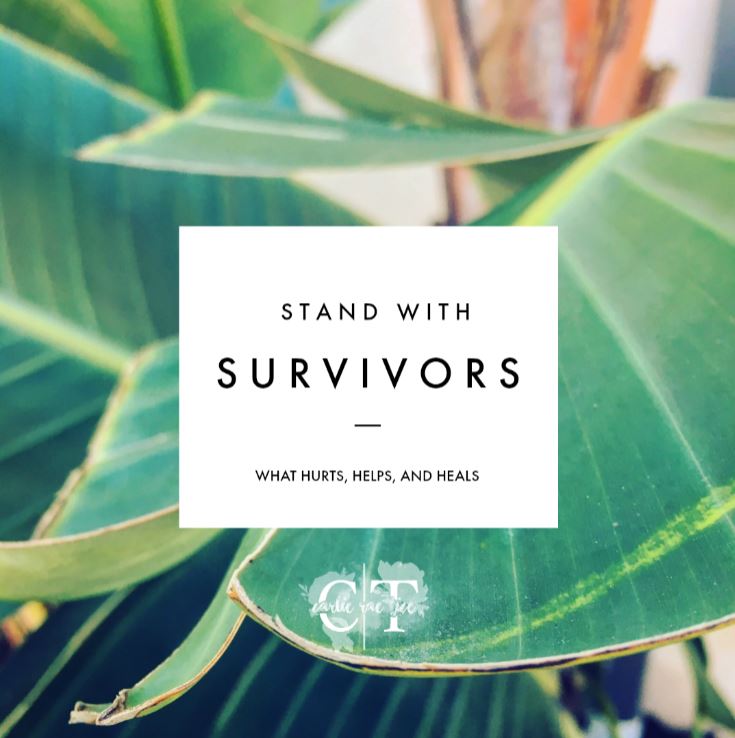|
|
THE BLOG |
|
The past few weeks, I've hardly slept. I keep waking up in the middle of the night, finding myself scrolling through survivors' stories, news reports, the Roy Moore campaign race, constantly looking to see who has been accused and who's admitted to it. I keep finding myself awake at 4:00am every day, listening to the stories of heartbreak and pain that drudge up my own past. I keep scrolling through #ChurchToo hashtags, spreading the light on the awful, dark, hidden stories of people who have experience sexual abuse in the church, and, many times, how horrendously religious people treat victims. I keep rubbing my eyes and wiping away tears at painful stories that ring too closely to home. My stomach has been in knots trying to figure out how to help, how to share, and, if I'm honest, if it's even worth it help, because it feels like it'll only be a drop in the ocean. The #MeToo Movement has taken off and exposed celebrities, CEOs, producers, TV hosts, pastors, you name it, there's an allegation and a #MeToo story behind it. The world has seen the bravery and courage from men and women of all walks of life, who have come forward to share the truth. We've seen perpetrators give apologies and recognition to their inexcusable behavior, resign from their positions, and leave the public eye. Many still refuse to leave or recognize their behavior, despite cases being built against them. The world is experiencing is the heartbreaking way many people have responded to survivors sharing their stories. Online hate grows and looms. If you listen in to the news and tune in to social media, you'll stumble across a newscaster covering someone's story and you'll start to hear what those who doubt, or simply don't want to believe, have to say. When I find myself sitting awake at 4am, I so badly wish I could come up with just the right thing to say. I wish I could sit at my laptop and think of the perfect answers and tell the whole world how to make sense of it all. I wish I could figure out the best way to help victims and survivors. I wish I could make sure this never happens to anyone else again. I wish I could erase all of the pain and hurt for all of us. But I can't, and no one can. But the one thing I can do is use what I know from my own #MeToo story and the stories of those who I've walked with and use it to help the world respond lovingly when they hear the terrible things that have happened to victims of abuse. There's so many things you can do to stand with a survivor to help them heal, and also sooo many things that can really, severely damage them in their healing process. Here are some things from my perspective as a survivor, and survivors that I've walked with and who have shared their #MeToo stories with me. T H I N G S T H A T H U R T:When you hear a survivor's story or someone sits down to tell you theirs, the most important thing to do is respond in a way that affirms them and makes them feel safe. If you know of an abusive situation that is happening or has happened in the past, don't push the victim to tell you details they don't feel comfortable sharing. Let them know you believe them, you support them, and you are there to listen whenever they need it. These are tips to help you navigate your relationships with the people in your life who have experienced sexual abuse because your heart may be in the right place, just trying to do your best to be supportive and loving, but you can inadvertently hurt them. These are extremely important skills to have, as 1/3 people will experience sexual assault. So when someone in your life experiences abuse, you can be prepared and ready to respond with open, loving arms. Here are some don'ts that you should steer away from at all costs:
T H I N G S T H A T H E L P A N D H E A LWhen you're walking with a victim on their journey to healing, remember to do your best to help them heal. As a victim, you often feel alone, misunderstood, and like no one will fight for you. So, as someone on the outside looking in, try to make your loved one feel comforted, understood, and like you will be their advocate. You won't always know what to do or how to help, but just trying can make a world of difference to someone who is experiencing the aftermath of abuse. Here are some "do's" to help encourage you to keep fighting for your loved ones in helpful, loving ways that will help them heal.
This can be a lot of information to take in and a lot to process. Just remember that making an effort to take these steps is appreciated and is helping, even if you don't feel like it. It may seem like a lot of do's and dont's, but it's all just precautions to make someone who has experienced one of the absolute worst things you can go through feel safe and comforted. Trauma is very painful and can last a lifetime, so being sensitive is important. You may feel like your efforts aren't worth it, but they are so important in the life of a survivor. If we all make efforts and take a stand for victims, we can truly change the world and change the way that survivors are treated. We can help heal those who have been beaten down and broken. We can fight for the truth. We can be a voice for the voiceless. We can make those who feel marginalized feel loved, cared for, and supported. We can love the forgotten and ignored like Jesus did. Your choices to advocate for survivors are making a difference. Thank you for doing what you do, and keep fighting. For statistics, facts, and resources on how to help survivors, visit https://www.rainn.org/. To talk to someone to receive 24/7 support, call 800-656-4673 for the National Sexual Assault Helpline. To hear stories of survivors or share yours, contact us here on the blog under the contact page.
Forgiven
2/13/2018 09:37:58 pm
I appreciate your willingness to speak and share, but I have to say that I disagree with you on one point. Forgiveness. As someone who was abused and neglected as a kid, I was always encouraged to forgive my abuser by those that loved me. Because they loved me they didn't want bitterness to destroy me like it does to so many. They wanted me to show my identity as a child of God, not as a victim or survivor. I have always appreciated that. Also we are commanded to forgive in the Bible(Eph 4:32 and countless others) so we should always encourage each other to forgive. Also forgiveness never means you have to trust someone or even have any sort of relationship with them, so please don't misunderstand me. :) I believe that we are the most Christ-like when we forgive. :)
Carlie Rae Tice
2/13/2018 10:03:34 pm
Hey there! We are absolutely called to forgive as followers in Christ. I stand firmly in the fact that God calls us to forgive and that we should forgive as Christ has forgiven us! It’s been a huge part of my story! It’s mentioned many times in the Bible, Matthew 6:14, John 20:23, Mark 11:25, Colossians 3:13, etc. and I would never deter anyone from forgiving. The point I was making in this list of unhelpful things was not to not forgive, that would be unbiblical, ungodly, and unhelpful to a survivor trying to heal. My point is simply that it’s very frustrating to share your story and have people in the Christian community disregard your story or lessen your hurt/pain and tell you to just forgive and forget. Forgiveness is great advice, but I can’t make anyone forgive, just as no one could make me forgive when I was walking through that painful time when I was sharing my story for the first time. I knew forgiveness was something I needed to work with the Lord to come to. I knew it was the godly response and something I needed to do, so it wasn’t helpful at all for me to constantly hear “just forgive” from people I was coming to to tell my story, while I was looking for a listening ear and comfort. I always say that forgiveness is so beneficial for healing, and it’s what God calls us to do as believers in Christ, but it’s something you have to work through when you’re ready, with God, in His strength. It definitely doesn’t mean forgetting or trusting someone. Forgiveness is ultimately between you and the Lord, so I put “don’t push victims to forgive” on the list of unhelpful things because it was unhelpful for me to hear it, knowing I needed to, because I was looking for people to listen not give me advice. The distinction here is not to push anyone to do anything. Encouragement and exhortation is so helpful and important, but pushing anyone to do anything is not. And these are all things from my own experience, just things in my journey that have hurt and helped me, along with things that other victims have shared with me that can hurt and help :) Comments are closed.
|








